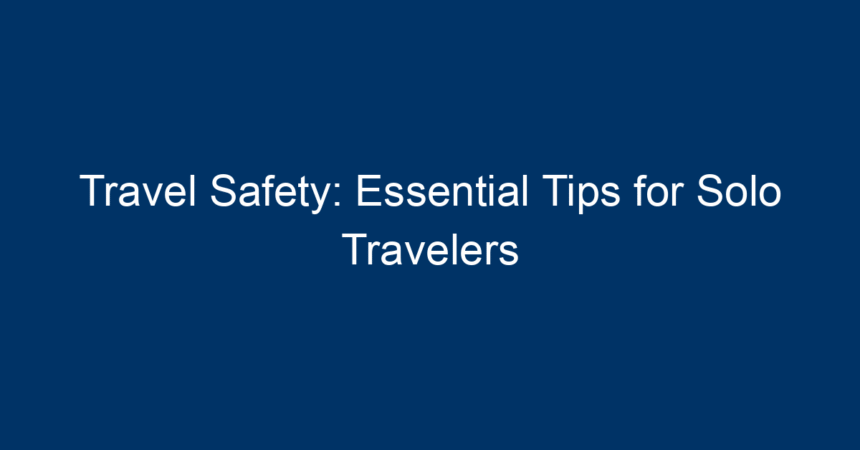Traveling solo can be one of the most liberating experiences of your life. It allows you to explore new destinations, meet people from different cultures, and discover facets of yourself you might not know. However, the freedom of solo travel comes with its own set of challenges. Travel safety is paramount, especially when navigating unfamiliar places alone. In this comprehensive guide, we’ll explore essential tips that every solo traveler should consider to ensure a safe and enjoyable journey.
Understanding Travel Safety
Travel safety encompasses various aspects of traveling, including personal security, awareness of surroundings, and taking precautionary measures to avoid potential risks. When you’re traveling alone, you might find yourself in situations that require quick decision-making and an understanding of your environment. Utilizing these travel safety tips will not only enhance your experience but also help you to travel with peace of mind.
Research Your Destination
Know Before You Go
One of the primary tenets of travel safety is preparing ahead. Before your trip, spend time researching your destination:
- Cultural Norms: Understanding the local customs can help you blend in and avoid inadvertently offending locals.
- Safety Ratings: Numerous websites provide up-to-date safety information about various countries and cities.
- Local Laws: Familiarize yourself with the laws and regulations of your destination, as they can significantly influence your safety.
Use Reliable Sources
Consult trusted travel guides, blogs, and forums to gain insights from travelers who have been to your intended destination. Websites like TripAdvisor or Lonely Planet offer user-generated content that can be invaluable for understanding potential safety issues.
Keep Your Belongings Secure
Use Anti-Theft Gear
Investing in anti-theft bags, pouches, and locks can give you peace of mind while exploring. These items are specifically designed to deter pickpockets and keep your belongings safe.
Maintain a Minimalist Approach
Pack light. Carry only what you need and keep your valuables—passport, cash, and electronics—in a secure location. Leave expensive items at home, and carry only a small amount of cash to minimize losses in case of theft.
Stay Connected
Share Your Itinerary
Inform friends or family members about your travel plans, including your itinerary and accommodations. Regularly check in with them to let them know you’re safe. This not only provides reassurance to those at home but also ensures someone is aware of your whereabouts.
Utilize Technology
Smartphones can be incredibly beneficial for travel safety. Download useful apps that offer maps, emergency services, and local information. Additionally, consider using a reputable VPN service to secure your internet connection, especially when using public Wi-Fi networks.
Choose Accommodations Wisely
Location Matters
When booking a place to stay, research the area’s safety. Opt for accommodations in well-lit, busy neighborhoods, even if they may cost a bit more. Proximity to attractions can also minimize the need for late-night transport.
Read Reviews
Take advantage of online reviews to gauge past guests’ experiences. Comments regarding safety and security can provide valuable insight into whether a place is the right choice for solo travelers.
Be Aware of Your Surroundings
Trust Your Instincts
Always listen to your gut feelings. If something feels off, don’t hesitate to remove yourself from the situation. Being aware of your surroundings allows you to better assess potential risks and make informed decisions.
Avoid Distractions
Keep your phone in your pocket when walking in unfamiliar areas. Being engaged with a device can make you an easy target for thieves. Instead, stay focused on your environment and remain aware of who and what is around you.
Plan Your Transportation
Research Public Transport
Understanding the local transportation system before you arrive can save you from unnecessary stress. Know which buses, trains, or taxis are safe to use, and ensure you have a plan for getting to and from your accommodations.
Use Reputable Services
When booking taxis or rideshares, always use well-known providers. Check that the licenses and insurance of any driver you engage with are valid. Avoid getting into cars that look suspicious or if the driver seems untrustworthy.
Stay Sober and Sociable
Limit Alcohol Intake
While enjoying a drink can be part of the travel experience, never let it compromise your safety. Drink responsibly, and always keep an eye on your drink to avoid tampering.
Engage with Fellow Travelers
Solo travel doesn’t mean you have to be alone. Join group tours or meet fellow travelers at your accommodation. Engaging with others can enhance your experience and even provide additional safety in numbers.
Prepare for Emergencies
Have a Safety Plan
Before you leave, familiarize yourself with the local emergency contacts, such as police and medical services. Keep a note of these numbers on your phone or written down in a secure place.
Keep Emergency Supplies
Pack a small first-aid kit including band-aids, pain relievers, and any personal prescriptions. It’s also wise to have crisis essentials, such as a whistle or pepper spray, if legal in your destination.
Conclusion
Traveling solo is about enriching your life with new experiences, learning about yourself, and meeting people from all walks of life. However, prioritizing travel safety should always be your top concern. By following these tips—conducting thorough research, maintaining awareness, and preparing for the unexpected—you can enjoy the freedom of solo travel while staying safe.
Travel safety isn’t just about avoiding dangerous situations; it’s about being proactive, prepared, and informed. Make the most of your journey while ensuring a secure and enjoyable adventure. Whether you’re hiking in the mountains or exploring a vibrant city, a little preparation goes a long way in making your solo travel experience memorable for the right reasons. Safe travels!




